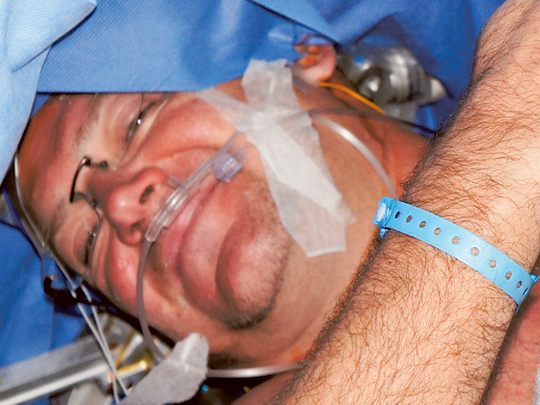
Dubai: In what is dubbed as a pioneering surgery in the UAE, neurosurgeon Dr Ahmad Bitar of Dubai’s Neuro Spinal Hospital has performed successful ‘awake brain surgeries’ on a number of patients.
Awake brain surgery reduces the chance of error to less than 2 per cent compared with 13-27 per cent in the conventional surgery.
Dr Bitar has operated on patients with tumours within or near areas that control important functions such as movement, sensitivity, speech, comprehension and sight. The surgery gets rid of the tumour without damaging any of these vital functions.
Neil Foster, 40, one of Dr Bitar’s patients, had successful surgery in February last year. A general manager with an oil services company in Dubai, Foster was diagnosed with a low-lying tumour in his brain that was affecting his speech and cognitive centre.
“After initial anaesthesia I was awake for a part during surgery where I was undergoing simultaneous tests of picture, speech recognition and logic even as the doctor was determining the route to my tumour without damaging any of the functions. The surgery lasted five hours and I was back at work within three days,” Foster said. He feels the new procedure reduced the recovery time manifold.
Intra-operating functional mapping makes it possible for the patient to rapidly bounce back to health, Dr Bitar said. He has presented several papers on this technique and method in medical conferences in the region.
Elaborating on the technique, Dr Bitar said: “For many years we were told that functional areas of the brain were all located in certain rigid areas of the brain. However, detailed brain mapping reveals that the anatomy of the brain differs in each individual especially in the area for cognitive functions such as language, sight, speech, logic. When tumours are in places that affect these vital functions of an individual it is of prime importance to study the functional anatomy of that patient and create an individualised map of the individual’s brain so that we excise the tumour without affecting or damaging these functions.”
“It is paramount for me not to damage any vital functions that may be affected while excising the tumour. Keeping the patient awake during the tumour removal helps me to determine that I am not damaging any vital function,” Dr Bitar said.












